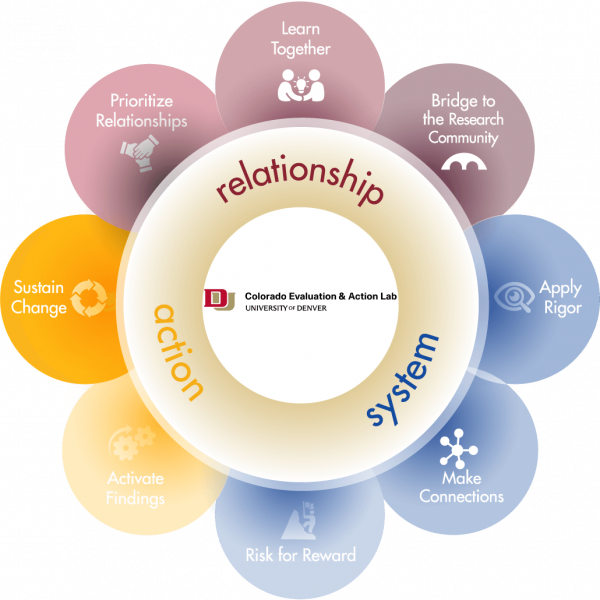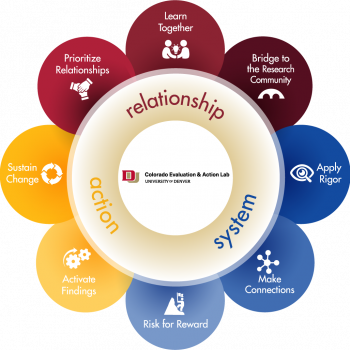
Celebrating the Fifth Anniversary of the Colorado Evaluation and Action Lab!
This is the final post in our special blog series to mark the fifth anniversary of the Colorado Evaluation and Action Lab. In each post, we have highlighted elements that are essential to our work with a broad range of government and community partners. The effectiveness of the work we undertake together is key to advancing systems and policies that strengthen opportunities to meaningfully improve the lives of Coloradans.
Like the challenges we seek solutions for, pathways to change are diverse. A recent example is Fostering Opportunities, a program that is making a tremendous difference in the lives of youth who have experienced foster care. Without intervention, only one in four students in foster care graduate from high school with their class. The Colorado Lab conducted a randomized controlled trial (RCT) of Fostering Opportunities, a program developed and piloted by Jefferson County Public Schools together with Jefferson County Human Services. Findings from the RCT show that students participating in the program had improved attendance rates, decreased suspensions, and were more likely to graduate on time. The RCT has led Fostering Opportunities to become the only approach in Colorado proven
Fostering Opportunities Improves Graduation Rates for Students in Foster Care via YouTube by Jeffco Public Schools – Colorado
to improve educational outcomes for middle and high school students in foster care. Consequently, the General Assembly decided to support the program in Jefferson County and two additional school districts in perpetuity through the state’s general fund (HB22-1374).
In addition to our evidence-building work around individual programs and practices, we are spending an increasing amount of time supporting the state in implementing a cohesive, systemically-aligned evidence-building approach via a “hub” model. The Colorado Lab currently oversees two hubs, the Family First Evidence-Building Hub and the Early Childhood Evaluation Hub. Each hub involves multiple rigorous evaluations that require coordination and a cross-system strategy. The Colorado Lab helps the state identify high-priority programs and practices, then acts as a “matchmaker” between governmental partners and evaluators to advance evidence-building around them. We start by matching the evaluation approach with where the program or practice is on the Steps to Building Evidence, and then identify the right evaluation team for the job. By activating and supporting our external research network, we expand our capacity to promote rigor in the evidence-building process while making the work actionable for informing policy and practice.
The Family First Evidence-Building Hub exemplifies the prioritization of sustaining change because it blends long-term strategy—facilitating the selection and scaling of evidence-based services—with evidence-building activities that help to maximize the federal reimbursement for these services. For example, Multisystemic Therapy (MST) is an expensive and intensive in-home service that has a proven track record for reducing youth recidivism. The Family First Hub team facilitated a financial mapping activity with MST experts and state agency leads who determined that there is a need to identify non-Medicaid dollars to pay for MST in Colorado. Diversified funding will allow the state to reach more families and leverage the Family First federal reimbursement opportunities for this service. The Family First Hub is also partnering with the Kempe Center for the Prevention and Treatment of Child Abuse and Neglect to build evidence for a teleheath-enhanced adaptation of MST so that this service can be more feasibly delivered in rural areas.
As we begin our sixth year, we’re excited to continue to learn together with our partners, further develop innovative approaches such as the hub, and discover new and ever-evolving pathways to build evidence and advance systems and policies that meaningfully improve the lives of Coloradans.
Read all of the posts in the Colorado Lab’s Special 5th Anniversary Blog Series: Essential Elements.
Tune in next month for the final blog post in this series. We’ll focus on our essential element, Sustain Change, exploring the ways in which we strive to understand the core causes of problems, identify opportunities to foster systemic change, and activate stakeholders from across systems to achieve and sustain change.
Please tell us if there is an essential element that stands out to you based on the work we’ve done together. Do you have a story to share? Is there something about the Colorado Lab that you would like to learn more about? What are your hopes for the future of Colorado’s policy lab? We would love to hear from you; a celebration is more fun when it’s shared with those we’re making this journey with!
Email us at admin@coloradolab.org.
